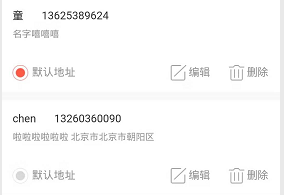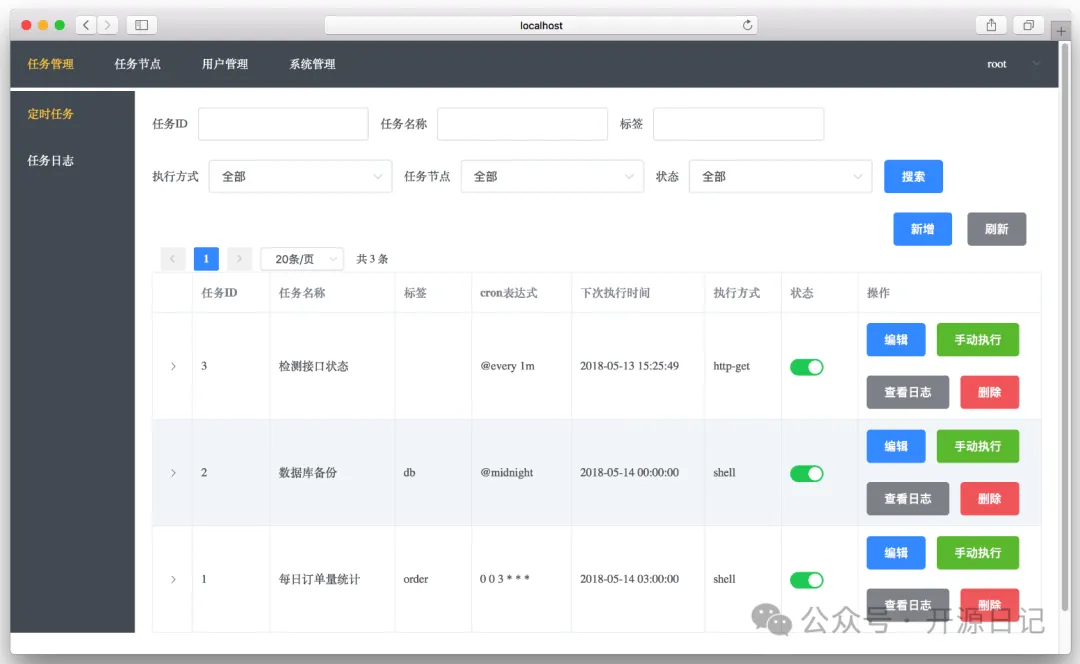安装
我使用的是 vue-cli 初始化项目,命令如下:
npm i -g vue-cli mkdir my-project && cd my-project vue init webpack
修改 package.json 文件:
...
\"dependencies\": {
\"vue\": \"^2.5.2\",
\"vue-router\": \"^3.0.1\",
\"element-ui\": \"^2.0.7\", // element-ui
\"axios\": \"^0.17.1\" // http 请求库
}
...
之后执行 npm install 进行安装依赖,如果安装速度有点慢的话,可以试一下 cnpm ,具体安装和用法自行查找。
简单介绍下项目的目录结构:
├─build // 构建配置 ├─config // 配置文件 ├─src // vue 开发源文件目录 ├────assets // css/js 文件 ├────components // vue 组件 ├────router // 路由 ├────App.vue // 启动组件 ├────main.js // 入口文件 ├─static // 静态文件目录 ├─test // 测试目录
之后在项目根目录执行 npm run dev ,打开浏览器输入 http://localhost:8080 就可以查看了。
目标
登录页面,登录,退出功能
首页,调用接口渲染列表
路由
路由使用的是 vue-router,具体用法可参考 官方文档
我们这里需要两个路由:
src/router/index.js
import Vue from \'vue\'
import Router from \'vue-router\'
import Index from \'@/components/Index\'
import Login from \'@/components/Login\'
Vue.use(Router)
const routers = new Router({
routes: [
{
path: \'/index\',
name: \'index\',
component: Index
},
{
path: \'/login\',
name: \'login\',
component: Login
}
]
})
routers.beforeEach((to, from, next) => {
if (to.name !== \'login\' && !localStorage.getItem(\'token\')) {
next({path: \'login\'})
} else {
next()
}
})
export default routers
登录页面
src/components/Login.vue
<template>
<div class=\"login\">
<el-form name=\"aa\" :inline=\"true\" label-position=\"right\" label-width=\"80px\">
<el-form-item label=\"用户名\">
<el-input v-model=\"user.name\"></el-input>
</el-form-item>
<el-form-item label=\"密码\">
<el-input type=\"password\" v-model=\"user.password\"></el-input>
</el-form-item>
<el-form-item label=\" \">
<el-button type=\"primary\" @click=\"login()\">登录</el-button>
</el-form-item>
</el-form>
</div>
</template>
<script>
import $http from \'@/api/\'
import config from \'@/config\'
export default {
data () {
return {
user: {
name: \'\',
password: \'\'
}
}
},
mounted: function () {
var token = localStorage.getItem(\'token\')
if (token) {
this.$router.push(\'/index\')
}
},
methods: {
login: function () {
var data = {
grant_type: \'password\',
client_id: config.oauth_client_id,
client_secret: config.oauth_secret,
username: this.user.name,
password: this.user.password
}
var _this = this
$http.login(data).then(function (res) {
if (res.status === 200) {
$http.setToken(res.data.access_token)
_this.$message({
showClose: false,
message: \'登录成功\',
type: \'success\'
})
_this.$router.push(\'/index\')
} else {
_this.$message({
showClose: false,
message: \'登录失败\',
type: \'error\'
})
}
})
}
}
}
</script>
<style>
.login{
width: 300px;
margin: 100px auto;
background-color: #ffffff;
padding: 30px 30px 5px;
border-radius: 5px;
}
</style>
首页
src/components/Index.vue
<template>
<div class=\"main\">
<el-table
stripe
v-loading=\"loading\"
element-loading-background=\"#dddddd\"
:data=\"tableData\"
style=\"width: 100%\">
<el-table-column
prop=\"id\"
label=\"ID\">
</el-table-column>
<el-table-column
prop=\"name\"
label=\"名称\">
</el-table-column>
</el-table>
<el-pagination
background
layout=\"prev, pager, next\"
:total=\"total\"
class=\"page\"
@current-change=\"pageList\">
</el-pagination>
</div>
</template>
<script>
import $http from \'@/api/\'
export default {
data () {
return {
tableData: [],
total: 0,
loading: false
}
},
mounted: function () {
this.getList()
},
methods: {
pageList: function (page) {
this.search.page = page
this.getList()
},
getList: function () {
var _this = this
_this.loading = true
$http.index().then(function (res) {
if (res.status === 200) {
_this.tableData = res.data.data.lists
_this.total = res.data.data.total
}
_this.loading = false
})
}
}
}
</script>
App
src/App.vue
<template>
<div id=\"app\">
<el-row v-if=\"token\">
<menus class=\"left-menu\">
<h3 class=\"logo\"><a href=\"/\" rel=\"external nofollow\" >Admin</a></h3>
</menus>
<el-col :span=\"21\" :gutter=\"0\" :offset=\"3\">
<el-breadcrumb separator-class=\"el-icon-arrow-right\" class=\"breadcrumb\">
<el-breadcrumb-item :to=\"{ path: \'/\' }\">首页</el-breadcrumb-item>
<el-breadcrumb-item class=\"active\">列表</el-breadcrumb-item>
</el-breadcrumb>
<el-dropdown @command=\"operate\" class=\"header\">
<img src=\"/static/image/head.jpg\" />
<el-dropdown-menu slot=\"dropdown\" :click=\"true\">
<el-dropdown-item command=\"/user/profile\">基本资料</el-dropdown-item>
<el-dropdown-item command=\"/logout\">安全退出</el-dropdown-item>
</el-dropdown-menu>
</el-dropdown>
<router-view/>
</el-col>
<el-col :span=\"21\" :gutter=\"0\" :offset=\"3\" class=\"footer\">Copyright © 2017 Flyerboy All Rights Reserved</el-col>
</el-row>
<router-view v-if=\"!token\" />
</div>
</template>
<script>
import Menus from \'@/components/Menu\'
export default {
name: \'App\',
data () {
return {
token: false
}
},
mounted: function () {
this.token = localStorage.getItem(\'token\') ? true : false
},
watch: {
\'$route.path\': function ($newVal, $oldVal) {
this.token = localStorage.getItem(\'token\') ? true : false
}
},
methods: {
operate: function (command) {
if (command === \'/logout\') {
localStorage.removeItem(\'token\')
this.$router.push(\'login\')
} else {
this.$router.push(command)
}
}
},
components: {
Menus
}
}
</script>
<style>
body{
margin: 0;
padding: 0;
background-color: #eeeeee;
}
.header{
position: absolute;
top: 5px;
right: 20px;
}
.header img{
width: 38px;
height: 38px;
border-radius: 20px;
border: 1px solid #aaaaaa;
}
#app {
font-family: \'Avenir\', Helvetica, Arial, sans-serif;
-webkit-font-smoothing: antialiased;
-moz-osx-font-smoothing: grayscale;
}
.main{
padding: 20px;
min-height: 600px;
margin-bottom: 20px;
}
.main table{
background: #ffffff;
}
.left-menu{
background-color: #33374B;
}
.logo{
padding: 20px 0 15px 20px;
font-size: 24px;
border-bottom: 2px solid #3a8ee6;
}
.logo a{
color: #ffffff;
text-decoration: none;
}
.left-menu .el-menu{
border-right: 0;
}
.breadcrumb{
line-height: 40px;
padding: 5px 20px;
background: #ffffff;
}
.breadcrumb span{
color: #069;
font-weight: normal;
}
.breadcrumb .active{
color: #aaaaaa;
}
.page{
margin: 20px 0 0;
margin-left: -10px;
}
.page .el-pager li.number{
background-color: #ffffff;
}
.el-submenu .el-menu-item{
padding-left: 60px !important;
}
.footer{
position: fixed;
bottom: 0;
right: 0;
font-size: 12px;
color: #888888;
padding: 15px 20px;
text-align: center;
background-color: #ffffff;
margin-top: 40px;
}
</style>
调用 API
src/api/index.js
import axios from \'axios\'
axios.defaults.baseURL = \'http://localhost:8000/\'
axios.defaults.headers.post[\'Content-Type\'] = \'application/x-www-form-urlencoded\'
axios.defaults.headers.common[\'Authorization\'] = \'Bearer \' + localStorage.getItem(\'token\')
export default {
setToken: function (token) {
localStorage.setItem(\'token\', token)
axios.defaults.headers.common[\'Authorization\'] = \'Bearer \' + token
},
login: function (param) {
return axios.post(\'oauth/token\', param)
},
index: function (params) {
return axios.get(\'api/user/list\', {
params: params
})
}
}
config
src/config.js 这里配置登录 oauth 需要的 client_id 和 secret
export default {
oauth_client_id: 2,
oauth_secret: \'\'
}
main.js
src/main.js
import Vue from \'vue\'
import App from \'./App\'
import router from \'./router\'
import ElementUI from \'element-ui\'
import \'element-ui/lib/theme-chalk/index.css\'
Vue.use(ElementUI)
Vue.config.productionTip = false
new Vue({
el: \'#app\',
router,
components: { App },
template: \'<App/>\'
})
api 接口
主要用到两个接口,一个是 api/oauth/token 登录获取 token 接口,一个获取列表 api/user/list。
第一个接口是用到 laravel oauth,第二个接口直接是一个简单的查询用户列表接口,详细讲会在下一篇文章中讲述。
以上就是本次整理的关于Vue Elememt-UI构建管理后台的全部内容,感谢大家对的支持。
© 版权声明
THE END










暂无评论内容